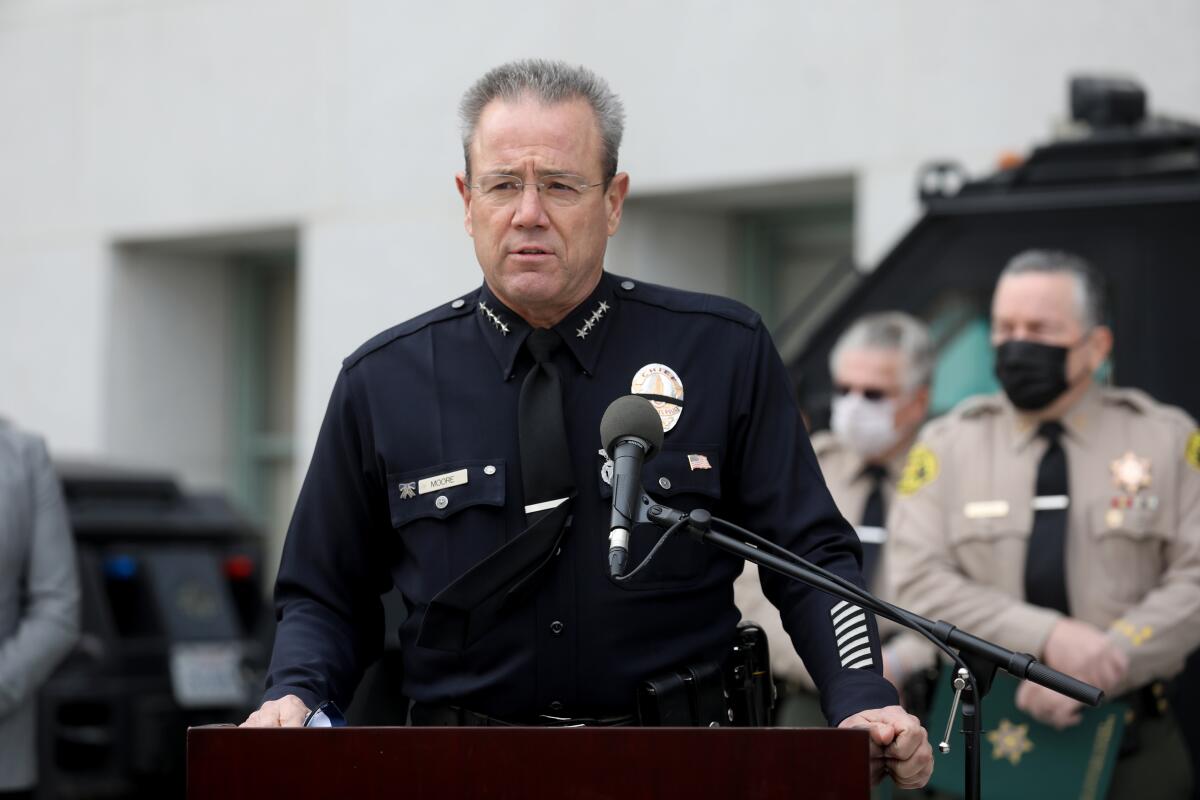The trouble with ‘civilian review’ over LAPD

- Share via
Watching L.A.’s elected leaders last year as they scurried to align themselves with Black Lives Matter protesters and criminal justice reformers, you’d think they were longtime police skeptics who had spent their careers pushing for tougher discipline of officers who use excessive force or commit other serious misconduct.
But in fact, Mayor Eric Garcetti and the City Council had just a few years earlier sent voters a ballot measure that moved sharply in the opposite direction, eroding the police chief’s powers to fire or otherwise penalize bad officers.
Charter Amendment C gave officers the astounding power to select their own appeals panels after the chief had called for them to be seriously disciplined. They could appeal to a traditional Board of Rights, made up of two high-ranking police officers and a civilian. Or, knowing from experience and numerous studies that the civilians tended to be far softer than the brass in meting out penalties, they could now choose an all-civilian board.
Garcetti brokered the measure with the Police Protective League (the union of rank-and-file LAPD officers), and the council hustled it onto a little-watched May 2017 ballot with nothing else on it but runoffs in a few council and school boards races. The Yes-on-C campaign pitched the measure toward sincere but, alas, inattentive police-reform-oriented voters who thought they’d be getting a real civilian review board with broad powers to hold police accountable.
The ploy worked. Charter Amendment C passed handily. The council took its own sweet time adopting the ordinance that gives the measure teeth, but it completed the job in 2019, the all-civilian boards were assembled, and officers facing termination or other serious discipline chose them more often than not.
Now the Police Commission’s inspector general has presented a study of the Boards of Rights proceedings conducted under this new scheme. And to the surprise of virtually no one, it turns out that the all-civilian boards have done what they were expected to do: Mete out lighter discipline than Chief Michel Moore sought. That includes keeping 11 officers on the job whom Moore believed to have committed acts so egregious as to warrant firing. That’s how the LAPD entered the summer of 2020, with its protests, COVID lockdowns and rising violent crime: with 11 badged and, presumably, lethally armed officers who’d been deemed unfit for duty by their chief, along with numerous others who drew lesser but still serious discipline only to have it overturned by their chosen appeals panels.
Remember this when the mayor makes a show of slashing police funding and council members tout their support for alternative crisis response as a way to curb police power: When push came to shove, they did the police union’s bidding and softened officer discipline. In an era of unparalleled opportunity for police reform, the most consequential step L.A. leaders took was to make it harder, not easier, to crack down on police misconduct.
Meeting with The Times’ editorial board last year, Moore said he needed more power to fire bad officers, not less, and he’s right. Police are the only city employees who have the power to kill the people they serve, so it’s well within the bounds of reason to hold them to a higher standard and accord more deference to their chief.
Yes, the Police Protective League and similar unions around the country are absolutely correct that officers deserve due process and should not be fired or demoted on a chief’s whim without review or appeal. The PPL also complained that command staff sitting on review boards would be unlikely to countermand their chief’s recommendation. But the way to address those concerns is not to rig the process to mete out softer discipline.
Let’s also remember that many police unions were formed expressly to push back against attempts to impose greater accountability and transparency, including in cases of discipline for racial discrimination and excessive force.
Charter Amendment C is on the books, but the City Council still has the power, should a majority of its 15 members have the guts to exercise it, to alter the composition of the civilian panel from which Boards of Rights are drawn so that they are more representative of the communities served, and sometimes abused, by the LAPD. That would be one small way to begin making amends for following the police union’s marching orders four short years ago.
More to Read
A cure for the common opinion
Get thought-provoking perspectives with our weekly newsletter.
You may occasionally receive promotional content from the Los Angeles Times.









